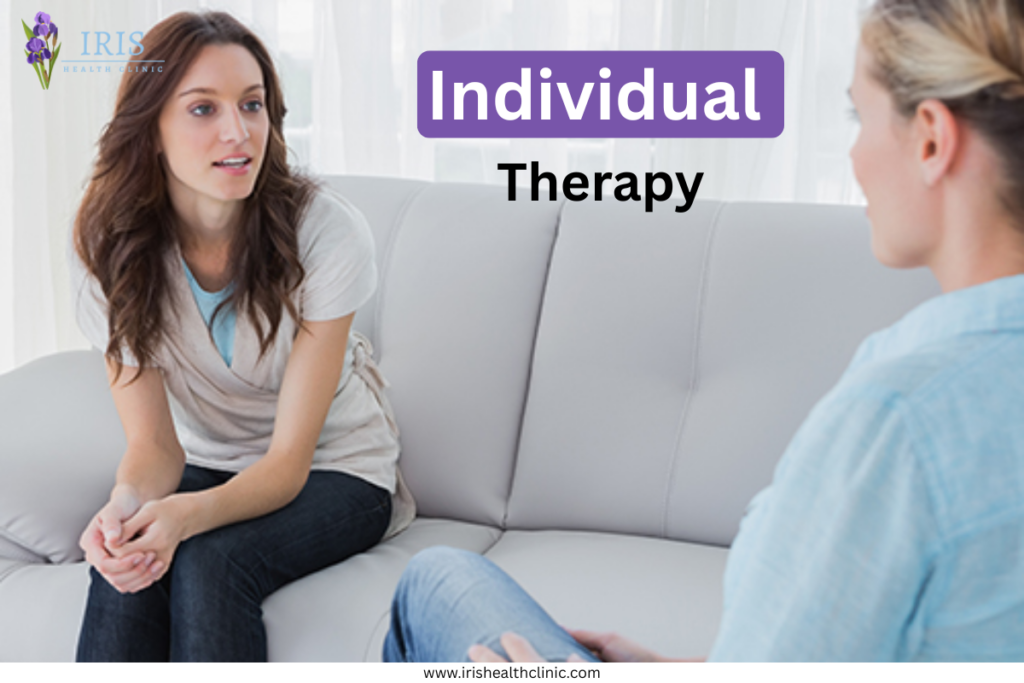Introduction
Shouldn’t the healing process be as personal given that addiction is a very personal problem? Though group therapy and structured rehab programs are vital, individual therapy for addiction treatment offers a unique and powerful arena for recovery. Individual therapy sessions provide a tailored approach that enables people to go deeply, process their suffering, and acquire the tools they need to keep sobriety over the long run. It’s not only about conversation.
Examining the elements that support the efficacy of personal therapy services in the process of recovering from addiction as well as the motivations behind more and more people selecting this individualised path will help us to understand.

1. A Safe Space for Open Dialogue
Discussing sensitive issues in group therapy can be frightening, especially for those who have identity-based problems, trauma, or shame. These special issues are held in private one-on-one sessions in an environment free from judgement where one can be totally honest.
That privacy fosters vulnerability, which often comes before genuine recovery. Whether the patient is coping with grief, childhood trauma, or co-occurring mental health disorders like anxiety or PTSD, individual therapy for addiction treatment offers the required space to investigate issues without fear.
2. Tailored, Targeted Care
Everybody’s experience with addiction is unique. A one-size-fits-all strategy is insufficient. The therapist can customise sessions with individual therapy services to fit each client’s unique needs, goals, and history. This adaptability makes it possible to implement focused tactics, such as learning coping mechanisms for cravings, treating underlying depression, or investigating trauma.
Therapists can use a range of evidence-based approaches, such as:
- CBT, or cognitive behavioural therapy
- DBT, or dialectical behaviour therapy
- Eye Movement Desensitisation and Reprocessing, or EMDR
- Motivational Interviewing
The recovery process can be accelerated by incorporating these techniques into one-on-one therapy sessions in ways that suit the patient’s readiness and pace.
3. Aids in determining causes
Often, drug use is an indicator of greater pain. Many people use drugs or drinking as self-medication for trauma not resolved, emotional distress, or mental health problems. Individual therapy for substance abuse treatment gives that individual the opportunity to identify the more profound underlying causes.
Through close collaboration with a therapist, people can:
- Recognise their triggers
- Handle trauma in a secure setting
- Reframe negative thought patterns.
- Create more wholesome emotional reactions
- Long-lasting recovery is frequently the result of this intense introspection.

4. Helps in Co-Occurring Conditions and Dual Diagnosis
Addiction is as common with mental illnesses such as PTSD, bipolar disorder, anxiety, or depression. There are many times these people will have, for example, social interaction disorder, such as schizophrenia. These disorders that occur simultaneously are often referred to as co-occurring disorders. Services for individual therapy are specially prepared to manage these intricacies.
Therapists can assist clients in one-on-one therapy sessions by:
- Control the signs and symptoms of mental illness
- Decrease dependence on drugs to control emotions
- Develop coping mechanisms that take mental health and addiction into account.
- Relapse risk is decreased and results are improved with this integrated approach.
5. Promotes Consistency and Accountability
Frequent individual therapy sessions can support recovery through accountability and consistency. A therapist walks with one on their journey, tracking progress, addressing setbacks, and celebrating victories.
The steady presence of a trustworthy therapist continues to provide grounding for the client through the recovery process while feelings and desires may begin to overwhelm during early stages of recovery.
Final Thoughts
Addiction treatment through individual therapy encompasses change and not mere conversations. Many find that it creates the space, framework, and encouragement necessary for healing in ways that feel right for them, healing that can be genuine and forever.
If you or a loved one are suffering from addiction, exploring individual therapy options might be the first steps toward true healing. Individual therapy sessions are often helpful since there isn’t only one road to recovery.

